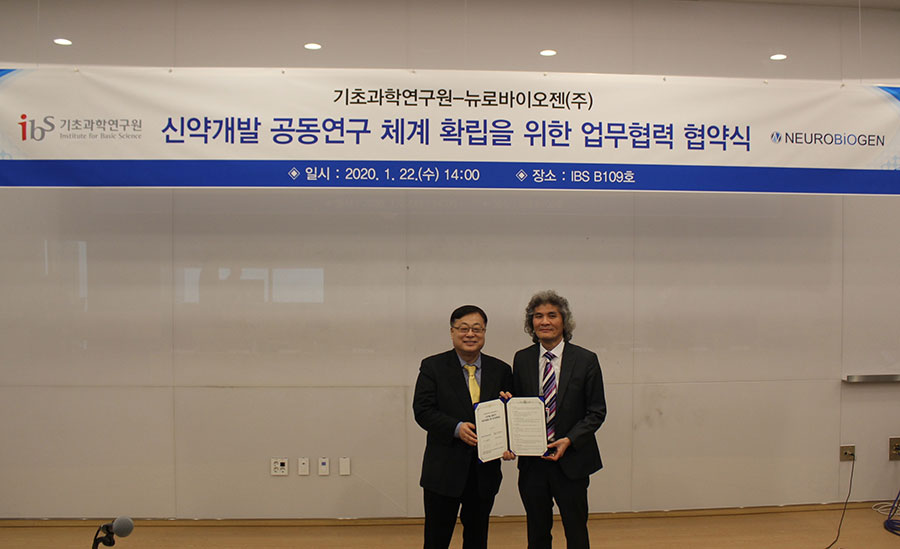주메뉴
- About IBS 연구원소개
-
Research Centers
연구단소개
- Research Outcomes
- Mathematics
- Physics
- Center for Underground Physics
- Center for Theoretical Physics of the Universe(Particle Theory and Cosmology Group)
- Center for Theoretical Physics of the Universe(Cosmology, Gravity and Astroparticle Physics Group)
- Center for Exotic Nuclear Studies
- Dark Matter Axion Group
- Center for Artificial Low Dimensional Electronic Systems
- Center for Theoretical Physics of Complex Systems
- Center for Quantum Nanoscience
- Center for Van der Waals Quantum Solids
- Center for Relativistic Laser Science
- Chemistry
- Life Sciences
- Earth Science
- Interdisciplinary
- Center for Neuroscience Imaging Research(Neuro Technology Group)
- Center for Neuroscience Imaging Research(Cognitive and Computational Neuroscience Group)
- Center for Algorithmic and Robotized Synthesis
- Center for Genome Engineering
- Center for Nanomedicine
- Center for Biomolecular and Cellular Structure
- Center for 2D Quantum Heterostructures
- Center for Quantum Conversion Research
- Institutes
- Korea Virus Research Institute
- News Center 뉴스 센터
- Career 인재초빙
- Living in Korea IBS School-UST
- IBS School 윤리경영


주메뉴
- About IBS
-
Research Centers
- Research Outcomes
- Mathematics
- Physics
- Center for Underground Physics
- Center for Theoretical Physics of the Universe(Particle Theory and Cosmology Group)
- Center for Theoretical Physics of the Universe(Cosmology, Gravity and Astroparticle Physics Group)
- Center for Exotic Nuclear Studies
- Dark Matter Axion Group
- Center for Artificial Low Dimensional Electronic Systems
- Center for Theoretical Physics of Complex Systems
- Center for Quantum Nanoscience
- Center for Van der Waals Quantum Solids
- Center for Relativistic Laser Science
- Chemistry
- Life Sciences
- Earth Science
- Interdisciplinary
- Center for Neuroscience Imaging Research(Neuro Technology Group)
- Center for Neuroscience Imaging Research(Cognitive and Computational Neuroscience Group)
- Center for Algorithmic and Robotized Synthesis
- Center for Genome Engineering
- Center for Nanomedicine
- Center for Biomolecular and Cellular Structure
- Center for 2D Quantum Heterostructures
- Center for Quantum Conversion Research
- Institutes
- Korea Virus Research Institute
- News Center
- Career
- Living in Korea
- IBS School
News Center
| Title | Joint R&D to develop a new drug for Alzheimer's disease | ||||
|---|---|---|---|---|---|
| Name | Communication Team | Registration Date | 2020-01-30 | Hits | 1237 |
| att. |
 thumb.jpg
thumb.jpg
|
||||
Joint R&D to develop a new drug for Alzheimer's disease
IBS has signed a memorandum of understanding (MOU) with the biopharmaceutical company Neurobiogen to develop a new drug based on SeReMABI (Selective Reversible MAO-B Inhibitor), a known possible Alzheimer's treatment. In 2014, the Cognitive Glioscience Group, led by Director C. Justin Lee of the IBS Center for Cognition and Sociality, identified the inhibition mechanism of GABA, the inhibitory neurotransmitter generated and secreted from the reactive astrocytes of the brain. Through a joint R&D project with the Convergence Research Center for Dementia DTC of the KIST, the team developed SeReMABI (KDS2010), a candidate drug expected to recover and enhance cognitive functions. SeReMABI constantly reduces the amount of GABA, over-generated in Alzheimer’s brains. While existing drugs only temporarily alleviate symptoms, SeReMABI is expected to cure the cause of dementia. In the 2019 experiment with mouse models for Alzheimer’s disease, researchers confirmed that SeReMABI improves and recovers cognitive function by inhibiting the activity of MAO-B, which induces over-generation of GABA. Based on the MOU, both parties will conduct joint research, including the study of additional treatment mechanisms and evaluation of efficacy, to develop a new drug from SeReMABI based on the reactive astrocytes. Since the drug has been known to be effective for treating Parkinson's disease, obesity, stroke, spinal cord injury, and dementia, success in the clinical experiment will maximize the value of the new drug. Amid continued clinical failures by global pharmaceutical companies, the MOU is expected to make a breakthrough in finding a cure for brain diseases. Director Lee said, “Combining our brain research infrastructure and know-how with the R&D competence of Neurobiogen will provide a breakthrough in developing a treatment for brain diseases, including Alzheimer’s disease. He added, “we are planning to conduct not only SeReMABI clinical trials, but also in-depth research on spinal cord injury and obesity - to increase clinical benefits.” |
|||||
| before | |
|---|---|
| before |
- Content Manager
- Public Relations Team : Yim Ji Yeob 042-878-8173
- Last Update 2023-11-28 14:20












